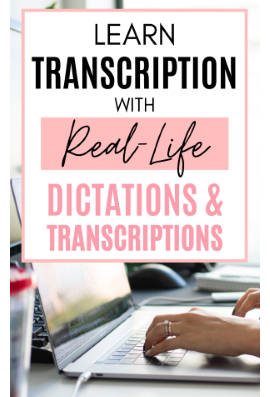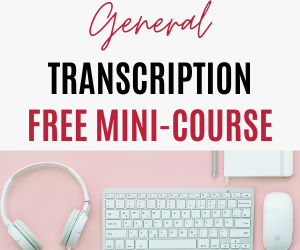To provide general transcription services, you don’t need a degree. And you don’t need to know medical or legal terminology. But you must be able to able to produce accurate transcripts and meet deadlines.
In this blog post, I’m discussing the skills you need to become a successful general and business transcriptionist. You need:
- Fast and accurate typing skills.
- Excellent English, spelling, grammar, and listening skills.
- Understanding accents.
- General knowledge.
- Computer skills.
1 – Fast and Accurate Typing skills
Some companies will let you get started with general transcription jobs from home when your typing speed is 40 wpm while other companies require a faster typing speed. You can get non-urgent transcription work if your typing speed is 40 wpm. But you'll be able to get better-paying transcription jobs when your typing speed is up to 55 or 70 wpm. You must have a speed of 65-75 wpm if you want to take on deadline-critical transcription work that requires fast turnaround.
You’ll need a good typing speed to make good money in transcription as you’re paid by production. The faster you can type, the more work you can do and the more money you’ll be able to make. Accuracy is a must.
You can increase your typing speed and transcription speed with practice. The more you type and transcribe, the faster you’ll get. If your typing speed needs work, use online typing tutorials to help build your speed. Your transcription speed will keep increasing gradually until you reach your ideal speed. You can find free typing tutorials here.
To help you build your speed and practice your transcription skills, you can download and transcribe podcasts, talk radio shows, or other audio you can find online.
Of course, the best audio to practice transcription is audio that is similar to the type of work you want to get. That’s why I’m providing practice audios to help you practice transcription and increase your speed and accuracy. They include finished transcripts so you can check your work and see how you’re doing.
Using practice files is the best way to learn and practice transcription. Check out my general transcription practice files here.
General Transcription: Theory & Practice™ is a detailed, all-inclusive, online, multi-media General Transcription Course by Janet Shaughnessy. It includes typing drills and lots of practice files to help you increase your speed and accuracy. Get more information about Janet's online general transcription course here.
Improving your typing speed and accuracy is essential but it’s not the only skill required of a professional transcriptionist.
2 – Excellent English, spelling, grammar and listening skills
It is essential to have a good grasp of English spelling, grammar, and punctuation. You can’t depend solely on spelling checkers and grammar checkers. You need to determine the spelling of words that are pronounced the same way but spelled differently like there,” “their,” or “they’re”.
The transcriptionist must have good listening skills to ensure that they transcribe every word in a recording accurately even when working with challenges like poor quality recording, accents, and multiple speakers talking at once.
To transcribe accurately, you need to be able to comprehend the content and use the context and your judgment to ensure that the transcript makes sense.
In general, clients prefer transcriptionists with English as their native language. Native English-speaking transcriptionists are familiar with idiomatic expressions and colloquialisms which voice recognition software and non-native speakers won’t grasp. Non-native-English speaking people are also having more trouble with grammar and punctuation. Those are just some of the reasons why general transcription work is not affected much by outsourcing to foreign countries.
You can improve your typing and grammar skills by taking classes online or at your local community college.
Janet Shaughnessy's General Transcription: Theory & Practice™ course puts a lot of emphasis on grammar and punctuation skills. Her course also includes transcription skills, transcription formats, and lots of practice files. You can check out her online general transcription course here.

3 – Understanding accents
Accents are common in transcription work and transcriptionists must be able to understand a variety of accents. You will encounter both regional U.S. and a variety of foreign accents. Some new transcriptionists have a hard time with heavy accents. But you will get used to accents. The more you listen to a particular accent, the better you’ll get at understanding them.
TIP: When transcribing speech with heavy accents, I recommend listening to the recording or part of the recording several times to become familiar with the accent. Listen at regular speed first, then slow down the audio and listen again. As it will take you longer to transcribe a file with heavy accents, you'll typically get paid more.
To learn more about transcription work and find out if transcription work is right for you, sign up for my FREE general transcription mini-course!
4 – General knowledge and industry knowledge
General transcription covers a wide range of topics and industries. General transcriptionists need good general knowledge as they may transcribe a large variety of topics that can range from academic to internet marketing, financial, and scientific topics.
Some general transcription jobs such as transcribing voicemail messages cover general information and require no specialized knowledge. Medical industries will obviously want someone with medical transcription experience and legal professionals will want someone with some legal experience.
Many transcriptionists will take on almost any transcription work they can get when getting started while others specialize in particular industries.
Each industry will have its own vocabulary, industry jargon, and formats and you’ll need to understand the terminology of the industry you want to work for. You'll need to become familiar with the types of documents, document formats, and procedures used within some industries. Many clients and transcription companies will provide templates and document samples.
Some industries are easier to start with and require less experience than others. Working for the same industry is easier since you’ll know the language used in that industry.
Reading about an industry and researching your client’s field can help you get familiar with industry-specific terminology. You can visit websites and read reports and newsletters of the industry you want to work for. You might have acquired knowledge of an industry through previous jobs. For example, if you have been a secretary at a real estate company or insurance office or have been a bank teller, you’ll have some knowledge of that industry and its terminology.
Online research skills are valuable. A transcriptionist must often conduct some research to check the meaning and spelling of unfamiliar words. You might also want to consult some reference books, dictionary, and thesaurus.
5 – Computer skills
You'll need moderate computer skills but you don’t need to be a computer guru. You need a working knowledge of email and Microsoft Word. You also need to be able to install transcription software and upload and download files.
Not sure if general transcription is right for you?
Explore a career in general transcription with my FREE general mini-course
Are you ready to become a general transcriptionist?
To become a successful transcriptionist, you need to provide accurate transcripts within the required time. I recommend that you improve any skills you need to work on and practice transcription to increase your speed and accuracy before applying for any transcription work and taking transcription tests.
Although formal training is not required, I encourage beginners to get specialized training. Taking a specialized transcription course will get you started the right way. It will speed up the learning process, help you pass transcription tests, make you a better transcriptionist, and help you get more work and higher-paying jobs.
I recommend Janet Shaughnessy’s detailed, online, multi-media general transcription course
Janet's General Transcription: Theory and Practice™ course includes typing drills, transcription skills, transcription formats, grammar skills, Word formatting tips, lots of practice files, and much more.
If you don't want to take a full course, you may want to Check out my general transcription practice files here.
TRANSCRIPTION RESOURCES
- FREE General Transcription Mini-Course.
- Detailed, multi-media General Transcription Course.
- General Transcription Practice Files.
- FREE Legal Transcription Mini-Course.
- Multi-media Legal Transcription Course.
- Medical Transcription Course.
- Check out this complete transcription starter kit at Amazon.
- Grammarly is the best online spelling and grammar checker to help you edit your transcripts. Grammarly has a free version and a premium version. Check it out here.
RECOMMENDED EQUIPMENT
- Equipment You’ll Need to Do Transcription Work
- How to Choose a Transcription Foot Pedal for Transcription Work
- How to Choose a Headset for Transcription Work
- If you are serious about doing transcription jobs from home, check out this complete transcription starter kit at Amazon. The kit includes Express Scribe Pro transcription software, USB Foot Pedal and USB Transcription Headset!
RECOMMENDED READING
You may want to read some of my other posts that will help you find transcription jobs for beginners.
- 7 Ways to Learn General Transcription and Become a General Transcriptionist Working from Home
- 5 Steps to Get Started in General Transcription and Get Transcription Work from Home
- How to Pass Transcription Employment Tests
- Top 25 Transcription Jobs for Beginners – No Experience Required
- 14 Work From Home Transcription Jobs That Pay Every Week
Disclaimer: If you purchase a product through a referral link, I will get a commission at NO extra cost to you and it helps me to keep providing you with quality information.



